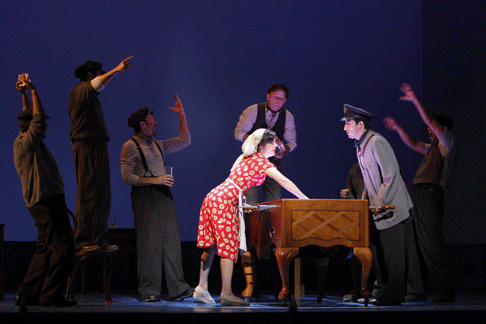Such wonderfully polyglot origins promise a more original and creative opera that Daniel Catán’s Il Postino turns out to be (Catán chose to keep the original Italian title). However, with Placido Domingo’s starpower and an endearing portrayal of the title character by Charles Castronovo, the Los Angeles Opera audience on the second night of the opera’s premiere run found much to applaud.
Catán is best known for Florencia en el Amazonas, his 1996 work that has enjoyed a fair number of performances since its debut, although a house as prestigious as the Metropolitan Opera, for example, seems to have no interest. Reviews of Catán’s music for his latest work still rely on comparisons to more famous composers for reference. The strongest element of Il Postino’s score is rhythmic; Catán often employs unusual meters and phrasing that give a sort of stutter-step feel to some of the music. His orchestration is colorful, if somewhat reliant on string outpourings at moment of dramatic and romantic effusion. Somehow he manages the trick of writing music with a melodic tinge without actually creating any strong melodic ideas. An impassioned rising motif that slowly resolves to the tonic pops up fairly frequently in the score, especially in the music for Mario Ruoppolo, the title character. Unfortunately, this one bit really does sound like Puccini - specifically, like a phrase from the score for La Rondine. Other than that, it’s wrong to call Catán’s music Puccini-esque - Catán has neither the melodic facility or grasp of using music to push the drama forward, rather than merely underscore it. If comparisons must be made, your reviewer heard a fair amount of Copland-like dance rhythms and sparse but attractive harmonies.
But his music is stronger than his libretto. The first two acts were given without intermission, and Catán chose to follow a screenplay’s quick changing scene formulation. So first we meet Mario at his humble home, and then from backstage a simple set rolls out depicting Neruda’s home in exile. This happened over and over, while a rather banal love story for Mario and a superfluous subplot about a corrupt politician and the island’s water supply interrupt the growing bond between the famous poet and his naive but charming postman. The last act’s storytelling really gets crude, with Vladimir Chernov’s Giorgio running on every couple minutes with some news about Neruda’s travels away from the island, and even a couple of awkward news-reel interpolations.
Still, by the time of the final scene, some emotional weight has been earned, and when the regretful Neruda is joined on stage by Mario (even though the character has died off stage at this point), most any viewer will be moved. Catán’s music is also at its best here - he stops trying to force a climax and lets the gentle story end with some lovely soft singing from the two male leads.
Domingo was excellent in the role of Neruda, although the lower part of his voice was surprisingly weak, given his recent forays into baritone territory. Catán gives all the main characters aria-like moments, and Domingo’s Neruda starts off with a hymn to his wife’s naked body. In fact, Neruda in the opera comes off as more than a bit self-involved and self-pleased, making Mario’s affection for the famous older man seem just a bit odd and obsessive. Nonetheless, Charles Castronovo, light-voiced though he may be, made his simple, love-besotted postman a real figure. The original casting had set Rolando Villazon for the role, who might well have covered the character's pathos with on-stage hi-jinks. As Mario’s love interest Beatrice, Amanda Squitieri sang out, sometimes covering her tenor co-star. Her opening aria, a self-introduction, is one of Catán’s weaker moments - dramatically inept and unmemorable musically. Cristina Gallardo-Domas has little to do as Neruda’s wife, and Nancy Fabiola-Herrera, as Beatrice’s gun-toting mama, got a few laughs.
 Amanda Squitieri as Beatrice and Charles Castronovo as Mario Ruoppolo
Amanda Squitieri as Beatrice and Charles Castronovo as Mario Ruoppolo
Conductor Grant Gershon managed the trickier rhythms of the score well. Director Ron Daniels couldn’t do much to ameliorate the wearing effect of the frequent scene changes, but he did elicit strong acting performances from the singers. Riccardo Hernandez created some nice costumes, but Los Angeles Opera’s budget restraints didn’t give him much to work with. In act three the budget seems to have run out altogether; other than a ridiculous set of pipes for the promised water system, the act mostly plays out on a bare stage, with some unimpressive projections and newsreel footage (designed by Philip Bussmann).
If Domingo chooses to, he can take Il Postino around the world to some of the more prestigious opera houses. It’s certainly a pleasant show, even a crowd-pleaser. But the opera’s long-term prospects don’t seem any more promising than those, say, of the U.S. Postal Service.
Chris Mullins

